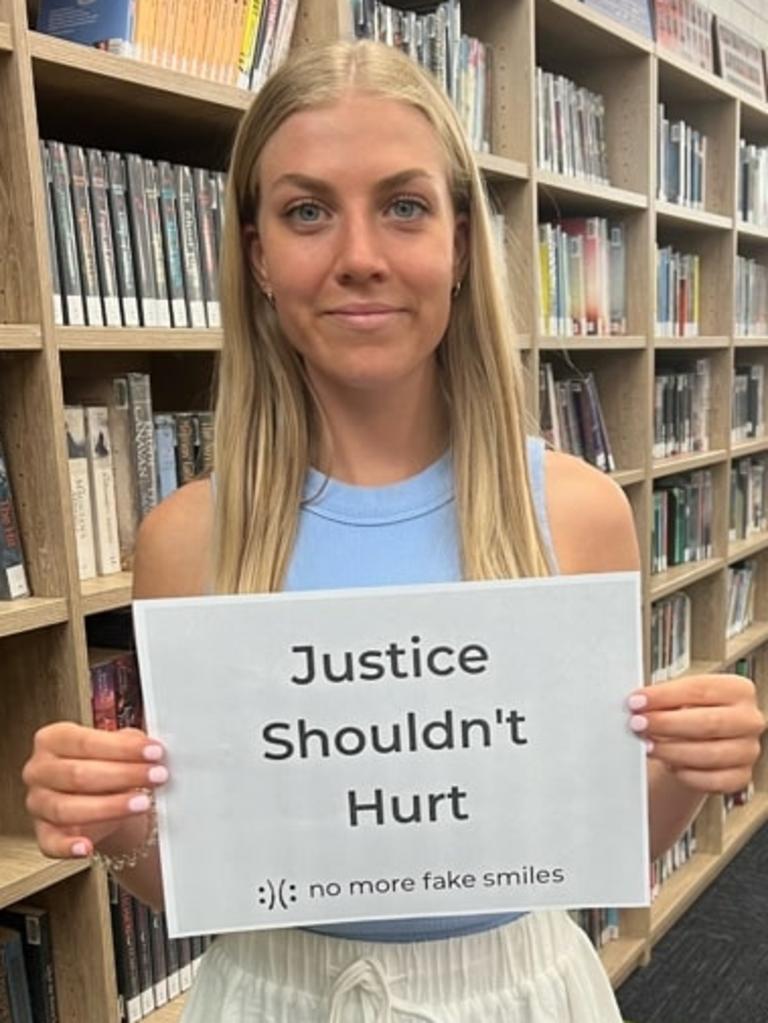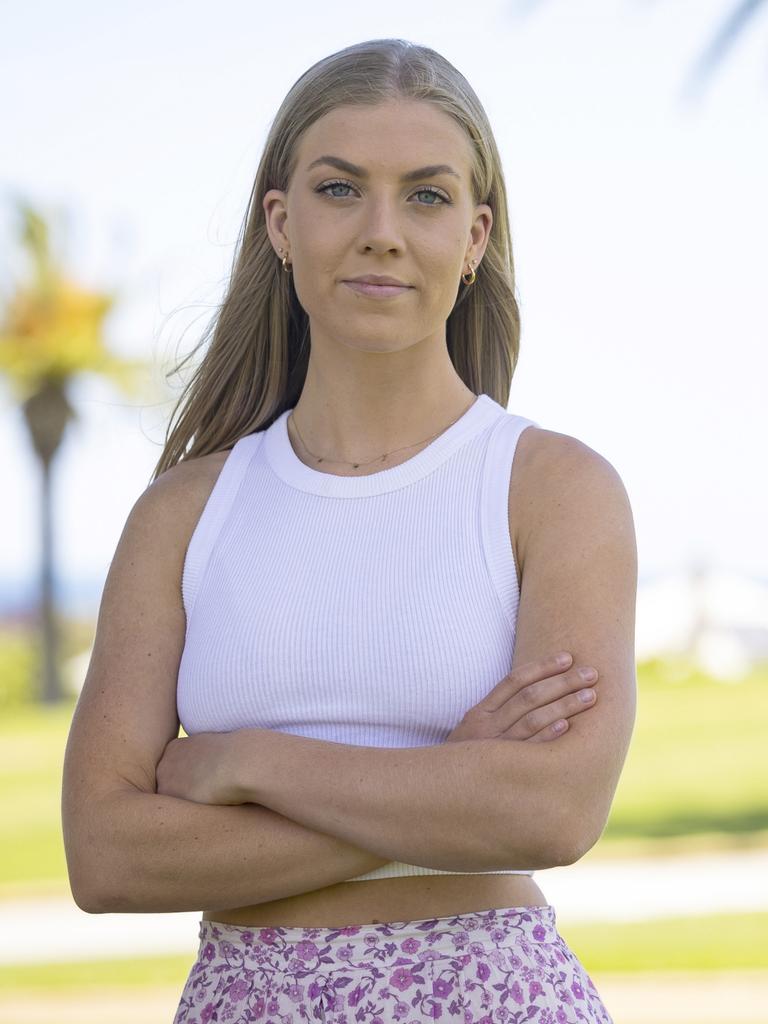Is this Australia’s Brock Turner moment?
Both of these men come from privileged, wealthy families. Both were elite athletes. And both escaped major punishment for rape. WARNING: GRAPHIC
Lifestyle
Don't miss out on the headlines from Lifestyle. Followed categories will be added to My News.
WARNING: GRAPHIC
When Madeline Lane heard the word “guilty” in the trial of her rapist, she yelped out loud.
“I’m not a screamer,” she said.
“But I knew the statistics and less than 2 per cent of sex offenders are found guilty.”
But Madi’s relief was short-lived.
A jury may have found Boyd Kramer – the Mosman man who targeted her on Tinder – guilty of rape, but it would be up to Judge John North to impose punishment.
“He was facing up to 14 years in jail, and I was told by the prosecution that they were expecting five,” says Madi, now aged 32.
Then, in June 2022, Judge John North ruled that Kramer would not spend a single night in jail. Instead, he would perform 300 hours of community service.
Any fleeting sense of justice Madi felt quickly turned to despair – the man who held her down and raped her while she fought and struggled would not be seeing the inside of a cell.
“That’s all my body was worth to the court. That’s all I was worth,” she says.


The case has drawn comparisons with that of Brock Turner, a Stanford University swimmer who sexually assaulted student Chanel Miller as she lay unconscious behind a dumpster on the American university campus.
Both men came from privileged, wealthy families. Both were elite athletes in the pool – one a champion swimmer, the other a national water polo player. And both received lenient sentences.
Brock Turner was sentenced to six months jail, but served only three – a sentence which sparked international outrage and protests in the USA.
Boyd Kramer, by contrast, never even saw the inside of a cell.
“Even one night would have felt like something,” says Madi.
Instead, following an unsuccessful bid by the prosecution to have his sentence increased, Kramer went out celebrating at the Mosman Club.
“He must have been feeling lucky,” says Madi.

Then came the news for Madi that this was not the first time Judge John North had attracted controversy over a lenient sentence for a sex offender.
Yesterday, news.com.au published four of Judge North’s other controversial findings, including the 2017 case of a Dubbo man who raped and abused little girls and was facing up to 54 years behind bars, but was instead given no jail time by Judge North for bizarre reasons including the offender’s high cholesterol, poor sleep and the fact he had a farm to maintain.
But now, we can reveal the most startling thing of all.
Judge John North’s sentencing decisions are far from unusual.
An analysis of data from the Australian Bureau of Statistics (ABS) has found that for every person found guilty of a sex offence in Australia in the 10-year period from 2010-11 to 2019-20, only one in two guilty offenders (52.6 per cent) received a sentence involving jail or a correctional facility.
That means that if a person was found guilty of rape, possession of child exploitation material (child pornography) or another sexual or indecent offence, they had a one-in-two chance of walking straight back out on the street with some lower punishment such as a good behaviour bond, fine or community service.
In total, of the 25,670 individuals who were found guilty of some form of sex crime in an Australian court in that decade, only 13,520 received a custodial sentence in a correctional facility.
The other 12,150 received a non-custodial sentence, such as work orders, monetary orders or some other non-custodial orders.
If we narrow the data to the most serious forms of offending – being penetrative sexual offending (and if we exclude youth offenders, who many feel are not served by custodial sentences) a full third (33 per cent) of adults who were found guilty of penetrative sex offences were still let off with a non-custodial sentence.
While some advocates push for mandatory sentencing (meaning an offender must go to jail once found guilty), others warn this can be a double-edged sword.
Experts warn that paradoxically, when we legislate mandatory sentencing, this can lead to a series of perverse outcomes including fewer guilty verdicts overall and a racial bias in who is found guilty.

Dr Rachael Burgin, Senior Lecturer in Criminal Justice at Swinburne University, says mandatory sentencing can produce fewer guilty verdicts overall because fewer offenders offer automatic guilty pleas upfront if they know there is no option other than jail.
“They instead throw their luck on the court, which forces the victim through a trial,” says Dr Burgin.
“Once in trial, juries may also be less likely to make a guilty finding if they feel the moral weight and responsibility of automatically sending that person to prison.”
So in practice, some juries may acquit a person who they believe is guilty, if that person was likeable, sympathetic or did not conform to a stereotype of what the jury expected a criminal to look like.
In recent years, numerous survivors have spoken out about the lenient outcomes in their own matters to highlight how out of step sentencing practices are with contemporary expectations.
This advocacy is useful as it shows our current approach to justice is not working.
One alternate suggestion is the introduction of specialist courts or specialist sexual assault judges who are uniquely trained to understand the complexity, nuances and gravity of sexual offending and who are thus more likely to impose sentences which are considered commensurate with the crime.
Already, NSW has adopted specialist judges in cases involving child victims as part of the Child Sexual Offence Evidence scheme. The scheme was successfully evaluated in 2018, and in 2023, following news.com.au’s Justice Shouldn’t Hurt campaign, the scheme was expanded across the state.
Annie Jones, who was in Year 7 when her stepdad began sexually abusing her, was part of the original pilot and feels the offender got a more appropriate sentence because of the specialist judge involved. He was sentenced to 17 years imprisonment with a non parole period of 11.5 years.
“I do believe I was fortunate to be able to be a part of the program,” says Annie.
“[But] child sexual abuse victims shouldn’t have to feel lucky or fortunate to be heard by a judge who can understand and empathise with them. It should be a right.”
Annie and her mum Tracey – who have since founded No More Fake Smiles – also believe that having a specially trained judge made a powerful difference to how Annie was treated in the courtroom.
“The judge in the pilot program was empathetic towards Annie and what she had been through,” says Tracey.
“The defence team wanted to cross-examine Annie [on] her Victim Impact Statement, which the judge did not appear impressed by. The judge protected Annie.
“In my opinion, it is imperative that all judges in child sexual abuse cases receive this training. It is the judge who controls the conduct and has the greatest impact on the courtroom.”


Now, experts are calling for specialist judges to preside over all sexual offence matters – not just those involving children.
“Sexual assault is a speciality area which requires expertise from the judiciary,” says Dr Rachael Burgin, who is also the CEO of Rape and Sexual Assault Research and Advocacy (RASARA).
Dr Burgin says that aside from specialist judges, specialist courts also offer a range of other benefits too, from separate entrances, exits, toilets and waiting areas, shorter time frames, fewer delays due to better case management and access to supports like translators, court support dogs and witness intermediaries.
“Specialist courts are more than just personnel. It’s the entire fabric of the system, from the architecture of the building to the process and accepted practice of how things are done,” she says.
“It’s about making the process and procedures responsive to the needs of victim-survivors, and ensuring they know what their rights are, so that victim-survivors don’t have to rely on the whim or goodwill of individual judges to make affordances.”
Right now, the Australian Law Reform Commission is reviewing how sexual offence matters are handled in Australian courts. Their recommendations are expected early next year.
In anticipation of those results, news.com.au has launched the Take the Stand campaign to highlight the existing problems with the criminal justice system through the eyes of victim-survivors who have experienced it.
Nina Funnell is Walkley Award winning journalist and the creator of the Take the Stand campaign run in exclusive partnership with news.com.au. Contact: ninafunnell@gmail.com
Originally published as Is this Australia’s Brock Turner moment?







